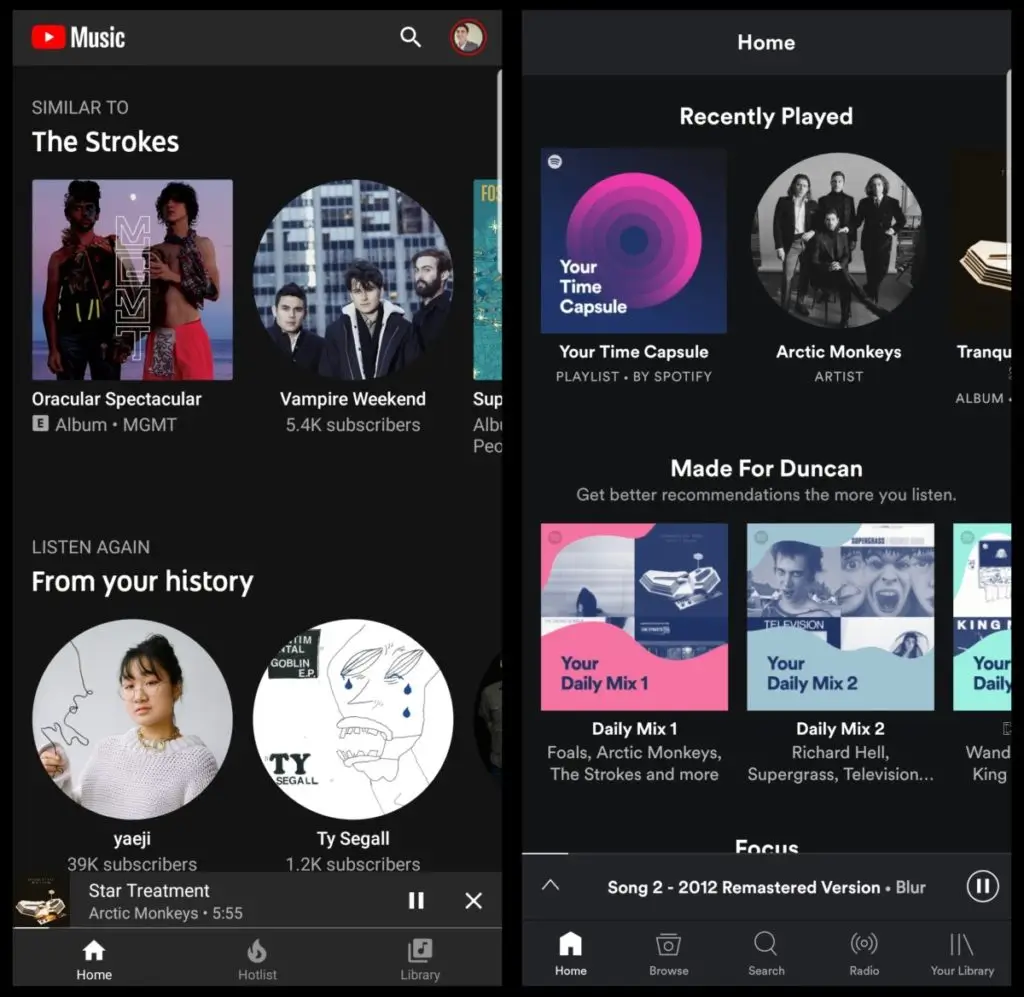Table of Contents
YouTube Music vs Spotify
Music streaming has become an integral part of our daily lives, with platforms like YouTube Music and Spotify leading the industry. While both services offer extensive music libraries, personalized recommendations, and unique features, they cater to different types of users. If you’re wondering which one is better, this in-depth comparison will help you decide.

1. Music Library and Content Availability
Both platforms provide millions of songs, but there are key differences in their approach to music availability.
Spotify: Spotify boasts an impressive catalog of over 100 million songs, covering everything from mainstream pop to indie and underground artists. The platform is also known for its extensive podcast library, making it a great choice for those who enjoy both music and spoken-word content. Additionally, professionally curated playlists help users explore different genres easily.
YouTube Music: YouTube Music, on the other hand, has unique advantages, such as access to the vast YouTube video library. This means you can find official tracks, remixes, live performances, and even user-uploaded content that isn’t available on Spotify. If you enjoy listening to rare or unofficial tracks, YouTube Music has a distinct edge.
| Feature | Spotify | YouTube Music |
|---|---|---|
| Number of Songs | 100M+ | Millions (including user-uploaded content) |
| Podcasts | Yes | Limited |
| Music Videos | No | Yes |
| Live Performances | Limited | Extensive |
Winner: YouTube Music (for variety and unofficial content) and Spotify (for structured music curation and podcasts).
2. Sound Quality and Streaming Performance
Audio quality plays a crucial role in the listening experience. If you’re an audiophile, this section is particularly important.
Spotify: Spotify offers up to 320 kbps audio quality for premium users, ensuring a crisp and high-definition listening experience. The platform is also optimized for seamless streaming, making transitions between songs smooth and lag-free. Whether you’re on Wi-Fi or mobile data, Spotify adjusts the bitrate automatically to provide the best possible experience.
YouTube Music: YouTube Music has a maximum bitrate of 256 kbps, which is slightly lower than Spotify. Additionally, since some tracks are available only in video format, they may consume more data compared to Spotify. However, users can turn off video playback to save data while still enjoying high-quality sound.
| Feature | Spotify | YouTube Music |
|---|---|---|
| Max Bitrate | 320 kbps | 256 kbps |
| Adaptive Streaming | Yes | Yes |
| Video Playback | No | Yes (optional) |
Winner: Spotify (better audio quality and efficient streaming).
3. Music Discovery and Personalization
An excellent music streaming service should help users find new music effortlessly. Both platforms use AI-driven recommendations, but Spotify’s system is more advanced.
Spotify: Spotify excels in music discovery with features such as
- Discover Weekly: A customized playlist updated every Monday, featuring songs tailored to your tastes.
- Daily Mixes: Multiple playlists that cater to different genres you enjoy.
- Release Radar: A playlist that introduces you to new songs from artists you follow.
Spotify’s recommendation engine is known for its accuracy, making it easy to find new music that aligns with your preferences.
YouTube Music: YouTube Music also offers strong discovery tools, including:
- Your Mix: A constantly updating playlist based on your listening habits.
- Discover Mix: A weekly selection of songs similar to your taste.
- New Release Mix: A collection of the latest songs from artists you follow.
- Samples Feature: Short music video clips that help you explore new tracks.
| Feature | Spotify | YouTube Music |
|---|---|---|
| AI Recommendations | Excellent | Good |
| Discover Weekly | Yes | No |
| Daily Mixes | Yes | No |
| Samples Feature | No | Yes |
Winner: Spotify (more refined and accurate recommendations).

4. User Experience and Interface
The user experience plays a vital role in how enjoyable a platform is. A clean, intuitive interface makes browsing and managing playlists more efficient.
Spotify: Spotify’s app features a dark-themed, minimalistic interface. It’s easy to navigate, and users can find their favorite songs, albums, and playlists without hassle. Podcasts are seamlessly integrated into the platform, making it an all-in-one entertainment hub.
YouTube Music: YouTube Music adopts a layout similar to the YouTube app, emphasizing video content. Some users find the interface cluttered, but it offers a more visually engaging experience with music videos and live performances.
| Feature | Spotify | YouTube Music |
|---|---|---|
| Interface | Minimalist | Video-centric |
| Podcast Integration | Yes | No |
| Video Support | No | Yes |
Winner: Spotify (simpler and more user-friendly interface).
5. Offline Playback and Download Features
Being able to listen to music offline is essential, especially for users who travel frequently.
Spotify: Spotify allows users to download up to 10,000 songs per device and supports up to five devices at a time. This feature ensures that users can access their favorite music even without an internet connection.
YouTube Music: YouTube Music’s offline feature is slightly different. The Offline Mixtape automatically downloads music based on your listening habits. However, if a song isn’t played within 30 days, it may be removed from the offline library.
| Feature | Spotify | YouTube Music |
|---|---|---|
| Max Downloads | 10,000 | No limit, but auto-removal after 30 days |
| Offline Mixtape | No | Yes |
Winner: Spotify (better control over downloads).
6. Compatibility and Device Support
Spotify: Spotify is compatible with smartphones, desktops, gaming consoles, smart speakers, and car infotainment systems. It also integrates well with Alexa, Google Assistant, and Apple HomePod.
YouTube Music: YouTube Music works on mobile devices, desktops, and smart TVs. It is optimized for Google Nest devices and Android Auto but lacks direct integration with gaming consoles.
| Feature | Spotify | YouTube Music |
|---|---|---|
| Smart Speakers | Yes | Yes |
| Gaming Consoles | Yes | No |
| Car Integration | Yes | Yes |
Winner: Spotify (better multi-device support).

Final Verdict: Which One Should You Choose?
Choose Spotify if:
- You want high-quality audio and smooth streaming.
- Music discovery and AI-curated playlists matter to you.
- You enjoy podcasts alongside music.
- You want social and collaborative playlist features.
Choose YouTube Music if:
- You enjoy watching music videos and live performances.
- You want access to remixes, covers, and unofficial tracks.
- You like auto-download features for offline listening.
- You prefer a service connected to the YouTube ecosystem.




